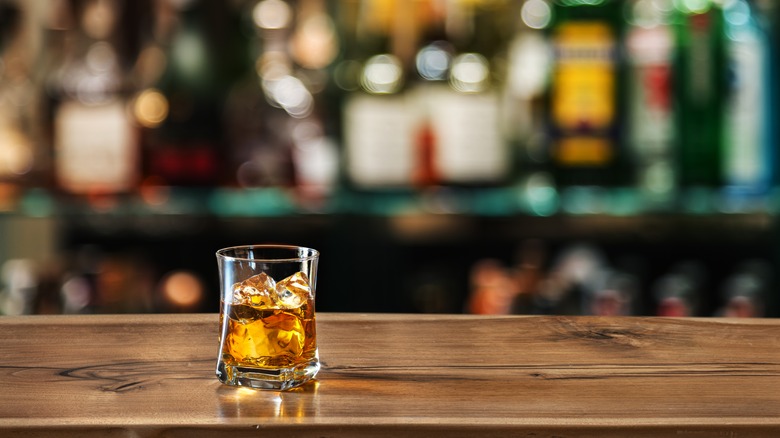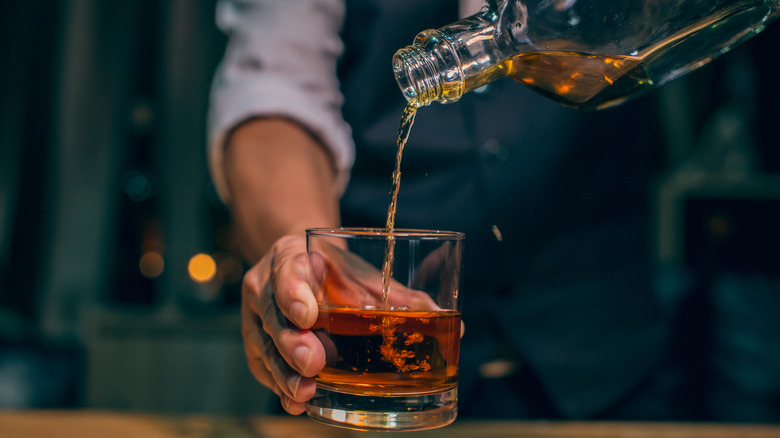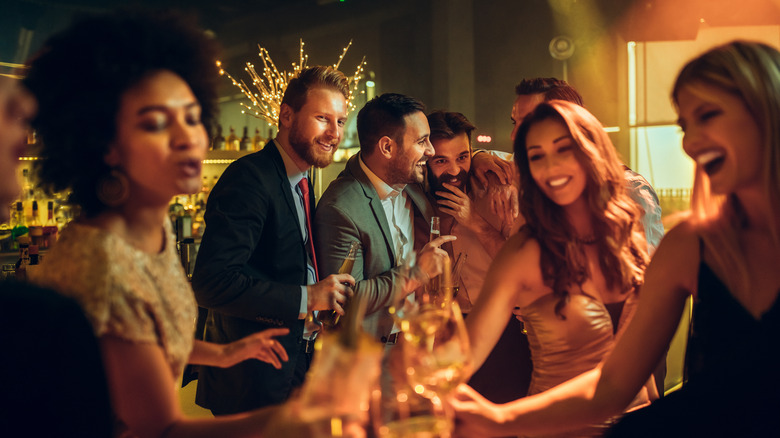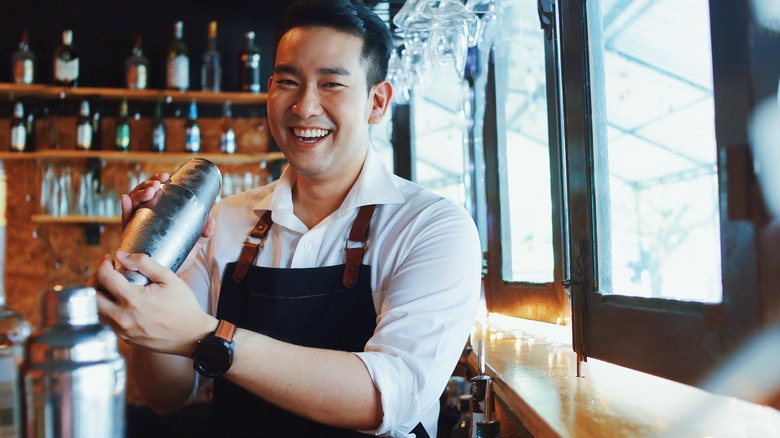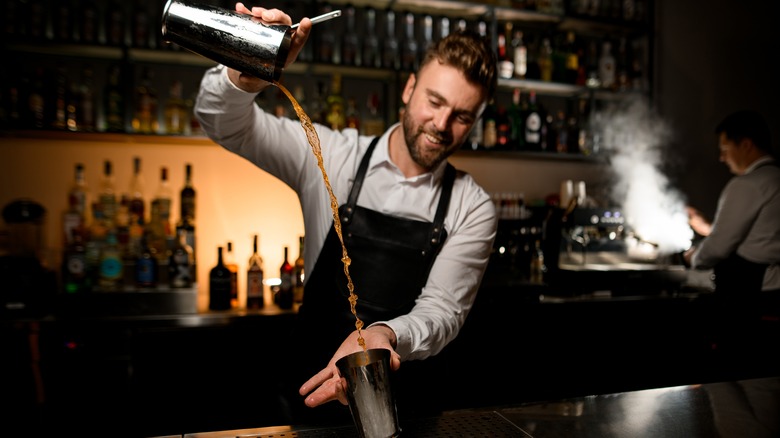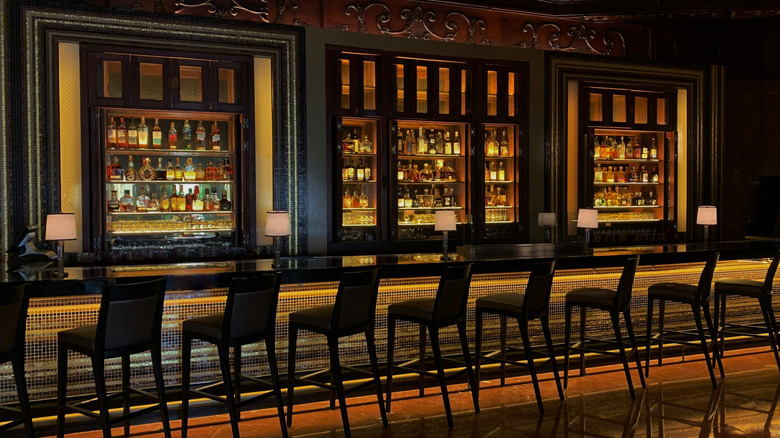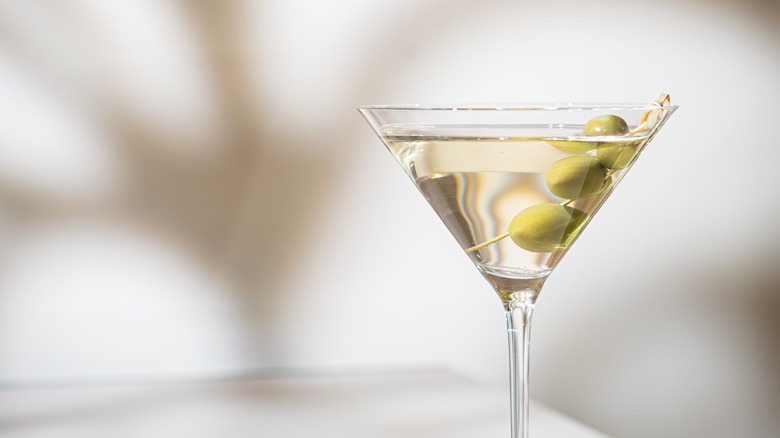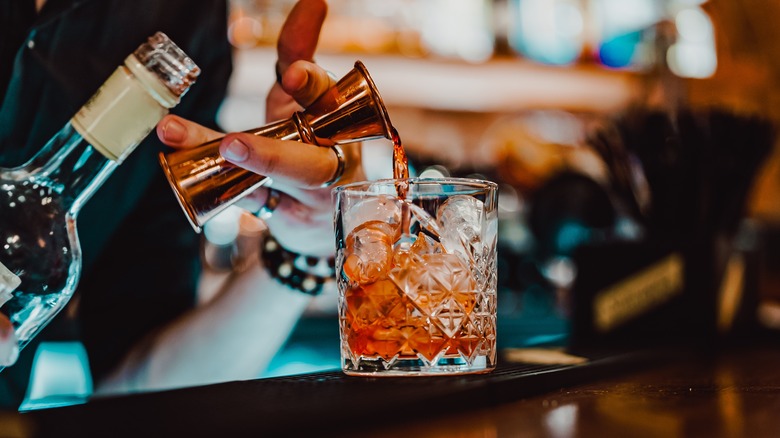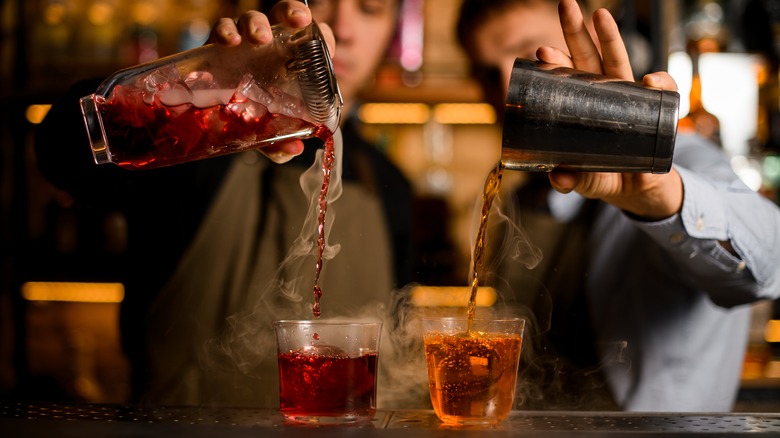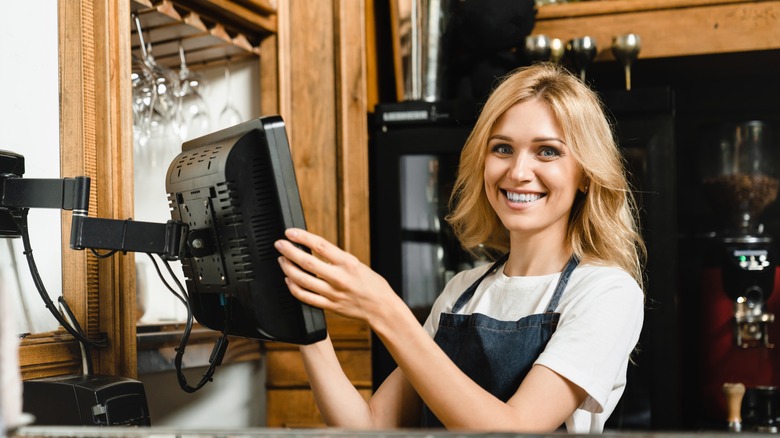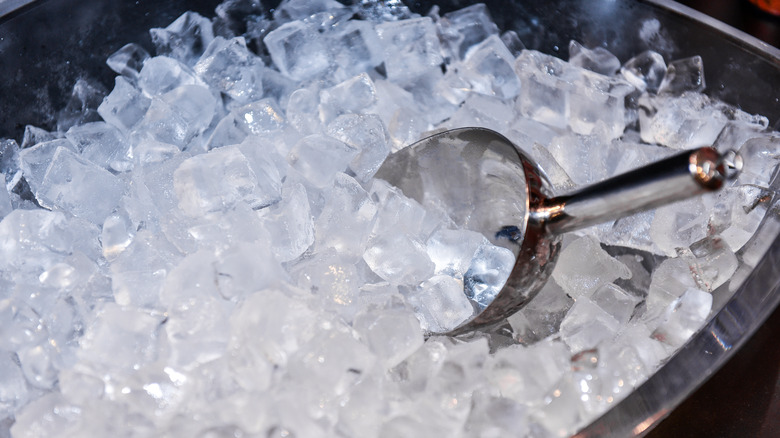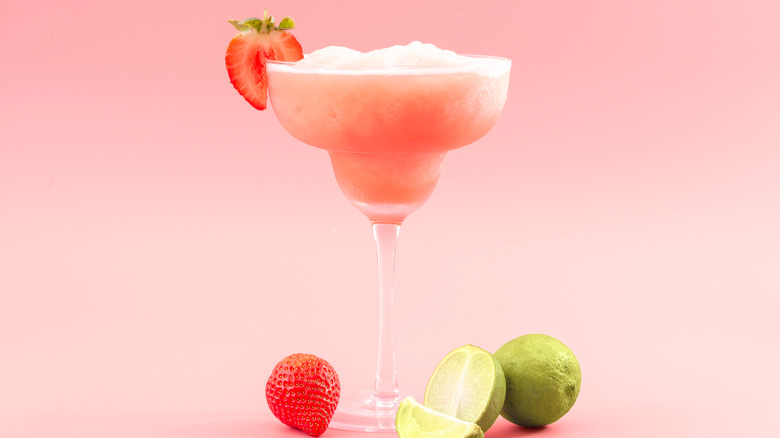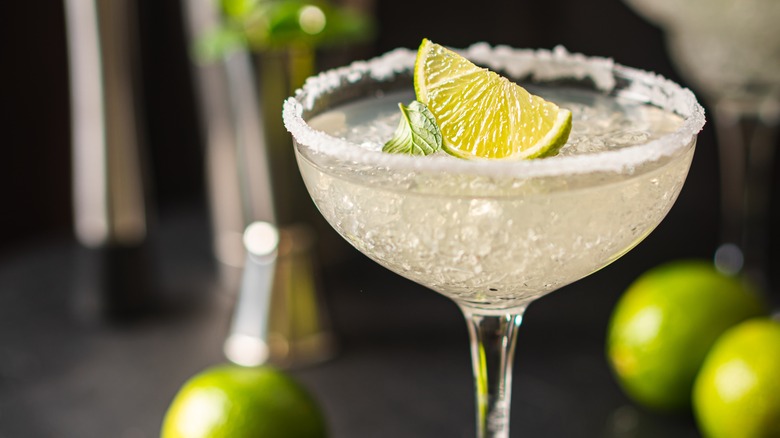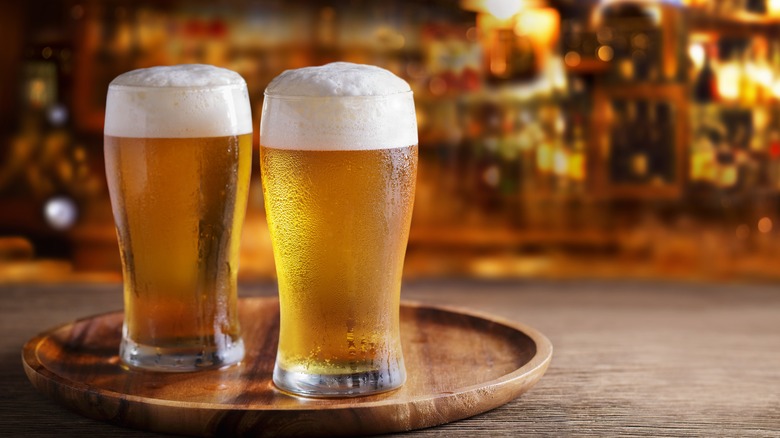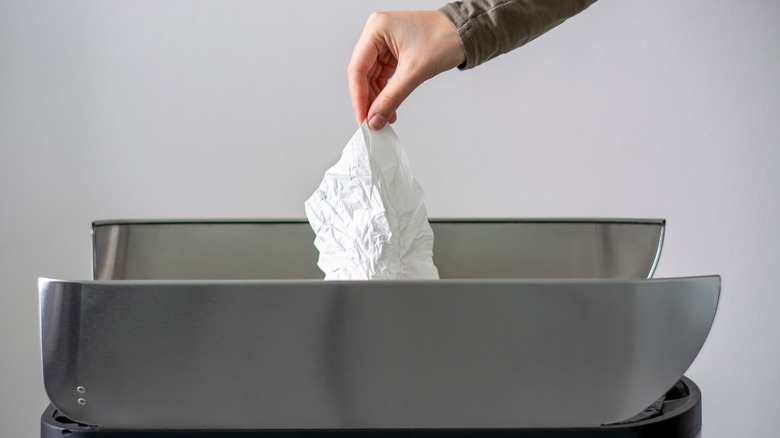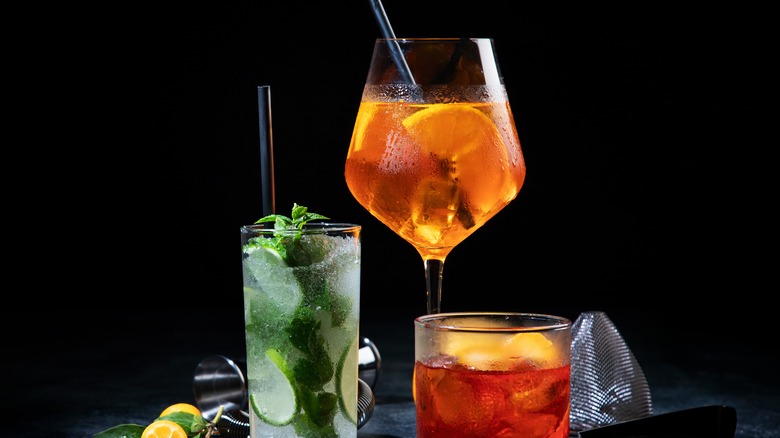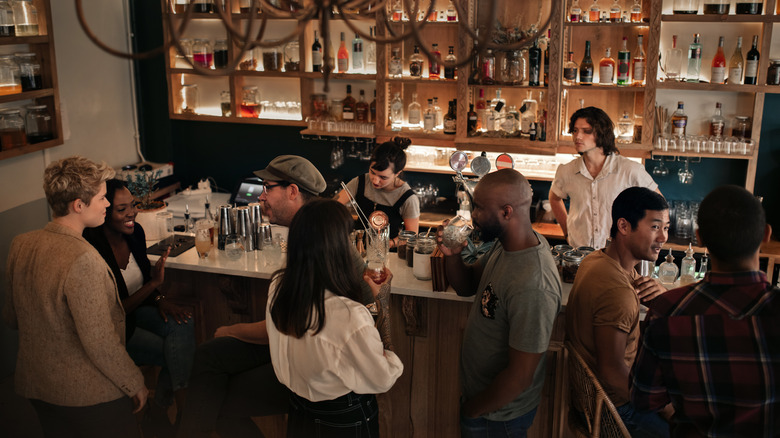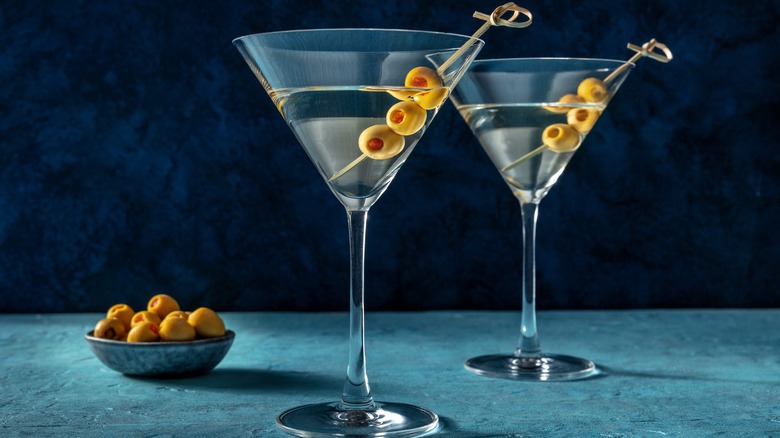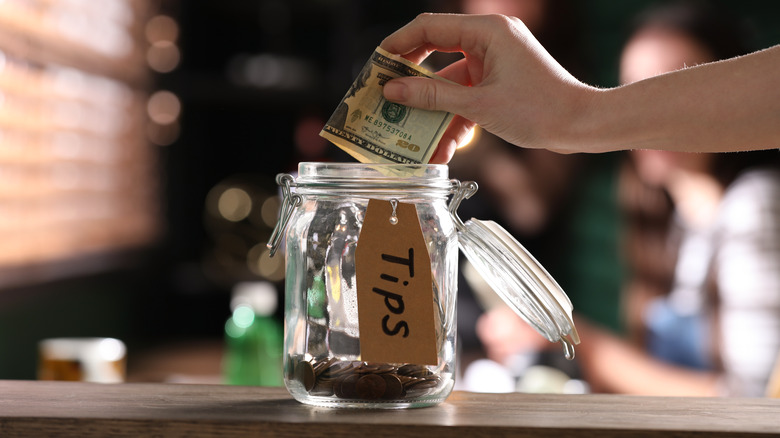18 Dos And Don'ts Of Ordering Drinks At A Bar
Ordering a drink at a bar is just like anything else — the more you practice, the more comfortable you'll be. While mastering the art of ordering an adult beverage through trial and error is certainly a fun strategy, having a few tips and tricks up your sleeve can help you skip to the top of the proverbial bar patron class.
If you've never worked behind a bar, you might not realize how much subtleties matter when it comes to ordering drinks. The way in which you place your order can clue the bartender into everything from how many drinks they're comfortable serving you, to how polite they think you are, to which cocktails they think you'll enjoy.
Understanding the basic dos and don'ts for ordering drinks at a bar will not only make your next bar visit more enjoyable, but it will also make the establishment's hardworking bartenders' lives easier, too.
Don't: ask for an extra strong drink
First impressions are important. Asking the bartender to make your drink extra strong is a reliable way to make a bad one. First of all, the amount of alcohol in your drink is about money, not your personal preferences. When a bar calculates how much it's going to charge for a drink, it's basing it on specific measurements. How else would it know how much it needs to charge in order to make a profit?
Second of all, bars use standard measurements for a reason — to keep everyone safe. When you're enjoying a night out on the town, it's easy to forget that alcohol is dangerous. Bartenders are essentially selling people poison, which is why it's crucial for them to keep tabs (literally) on how much each patron is consuming.
Even when you see bartenders seemingly free pouring, we promise they aren't just measuring with their hearts. Bartenders are trained to know exactly how much liquor they're putting into each and every drink. It might not seem like an extra ounce here and there could do any harm, but those extra ounces can add up to a dangerous problem.
If you do want an extra strong drink, we get it. Just be sure to order a double so the bartender can charge and monitor your alcohol consumption accordingly.
Don't: try to skip the line
It doesn't matter how thirsty you are — do not try to skip the line to order your drink at the bar. Now, some people believe that since the line at the bar is a little more nebulous than say, the line at the post office, they don't have to abide by common social norms and niceties. As you might suspect, those people are wrong.
Bartenders are experts at seeing through the chaos, and they're more aware of who sidled up first than you may realize. This means that if you try to flag them down to get your vodka soda before the person who's been waiting patiently for their attention, you may find yourself waiting quite a long time. Bartenders' entire livelihoods depend on serving people quickly and efficiently, and we can assure you there's a method to their madness.
Do: remember your manners
Even if you order a mojito on a Friday night (again — please don't) the bartender will like you a lot more if you treat them with respect. A simple "please" or "thank you" will get you a lot further than you realize. This one may seem like it's too obvious to even be included on this list, but trust us, there are a lot of people out there who think it's appropriate to place their orders by barking orders at the poor soul behind the bar.
Bartenders are humans. They make mistakes and have off days just like everyone else. Unfortunately, people tend to forget this when they're drunk, in a rush, or trying to drink away the pain of their own bad day.
The polite response to "hi, how are you?" is never "vodka soda" no matter how badly you want your drink. We're not saying you need to go out of your way to accommodate the bartender's mood (they are there to serve you, after all) — we're just asking you to be nice.
Don't: ask for a complicated drink if it's slammed
This one isn't a hard and fast rule, but rather a suggestion (read: desperate plea) to read the room. And by read the room, we mean read the bar. If you're visiting a New York City cocktail bar, then by all means order the flaming, smoked, 15-ingredient concoction you saw on Instagram. Cocktail bars — and the bartenders who work in these types of establishments — are equipped to make complicated drinks during even the busiest of rushes.
Dive bars with a single employee running the show, on the other hand, are not. If you can tell that the bartender is struggling to keep their head above water, please don't order a bespoke cocktail that's going to make their life harder. Have a heart and order a beer, a shot, or something with two ingredients or less. Not only will you be doing a good deed, but you'll get your drink a lot faster, too.
Don't: put your stuff on an empty bar stool
Each and every bar stool represents an opportunity for the bar to make a profit. When you put your stuff on one of them, you're deterring another guest from sitting down and spending. If you take umbrage with the fact that bars are businesses, and that the point of a business is to make money, then we highly recommend you stay home and brush up on your economics 101.
Plus, almost every bar has hooks underneath that were designed to hold your jacket, purse, and shopping bags. By no means are we saying you need to put your belongings on the floor or on your lap — we're just saying that your scarf doesn't get its own bar stool.
If it's a Monday night and the bar is completely quiet, it might be a different story. However, you need to be aware of when guests walk through the doors (even after you've had a few drinks and could be prone to paying less attention) who might appreciate a seat.
Do: know how you'd like your martini
Ordering a martini requires a little know-how. Simply declaring that you'd like a martini doesn't give the bartender nearly enough information. Knowing how to order a martini will not only make you look like a cocktail pro, but it will also make things easier on the bartender since they won't have to ask you multiple follow-up questions.
The most important thing to let the bartender know is if you'd like your martini to be made with vodka or gin. Next, they need to know if you'd like your beverage up or on the rocks. Finally, you need to decide if you'd like your drink to be garnished with an olive or a twist. You can go into even more detail by requesting a martini that's dry, dirty, wet, or perfect (yes, that's a real term) but that's a lesson for another day.
The last thing we'll say on this topic is that ordering a martini can be intimidating. If you get to the bar and forget everything we just taught you, don't worry! Even bartenders get tripped up by all the different martini variations from time to time. As long as you're polite and conscientious, you'll have an ice-cold beverage in your hand before you know it.
Don't: say you can't taste the alcohol
Even if it's their first day on the job, 99.9% of bartenders are going to remember to put the tequila in your tequila soda. Yes, there is the minuscule (and we mean minuscule) chance that they forgot, but the odds of this occurring are so low that if this genuinely happens to you, it's probably a sign you should buy a lottery ticket.
As we said, bartenders are incredibly aware of how much liquor they're pouring. Just because your ratio for a gin and tonic at home is 75% gin to 25% tonic, doesn't mean that your local is going to follow suit. The liquor is still in there, we promise.
If you really care about tasting the booze, you should also steer clear of sweet, fruity cocktails that are designed to mask the taste of liquor. Or, just order it neat and call it a day.
Do: order dealer's choice wisely
Requesting "dealer's choice" from a bartender means you're putting your drink in their hands — literally. Allowing the bartender to make whatever they see fit can be a great way to discover new cocktails, break out of a beverage rut, or just save yourself from having to choose from a lengthy cocktail menu. However, bartenders aren't mind readers, and it's up to you to provide them with a few clues to help ensure you end up with a beverage you actually enjoy.
Even though the point of ordering dealer's choice is to be surprised, there's a world of difference between a spirit-forward, stirred riff on a Negroni and a tart, refreshing margarita variation — and you need to let the bartender know which style of drink is more up your alley.
Providing some basic parameters such as whether you enjoy sweet, bitter, or spicy cocktails, along with your base liquor of choice, will set the bartender up for success. You can even go a step further and let them know some of your favorite flavors or classic cocktails. It's also crucial to make the bartender aware of any allergies, dietary restrictions, or ingredients you dislike before they start making your drink.
Don't: close your tab if you want multiple rounds
If you really want to make an enemy, try closing out your bar tab four separate times for four separate rounds of drinks. Not only is this illogical, but it's also downright annoying.
Closing a tab takes time. It requires the bartender to stop making drinks so they can run your credit card. This means that when you insist on paying for each round separately, you're testing the bartender's patience as well as making your fellow bar patrons wait longer for their drinks. It's not a good look.
Now, we've all been in a situation where we planned to go home after closing out, but decided on just one more drink to keep the night going. Changing your mind is completely different than knowing full and well you intend to have three beers, yet still closing out after each one.
Say it with us: Keep it open, please.
Don't: expect less ice to mean more alcohol
It makes a lot of sense for bartenders to replace (essentially) free ice with costly alcohol, right? Wrong. We're not sure who came up with the notion that asking for less ice will result in a stronger drink, but they're certainly no friend of ours (or of any bartender).
If you ask for less ice, you're going to get one of two things: more mixer or more room in the glass. One thing you're not going to get is more alcohol. People think they're being crafty with this one, but we assure you that the bartender has heard it a million times before and is internally rolling their eyes at you.
There's absolutely nothing wrong with wanting your beverage to contain fewer cubes, but it is helpful to specify the goal of your request to the bartender (which should never be to get more booze). For example, if you want a rum and coke with less ice, but don't want them to change the amount of coke they add to the drink, let them know. Otherwise, they might just fill the glass with more mixer, and then you'll be one of those people complaining that they can't taste the alcohol.
Don't: order a frozen drink if it's busy
If you've never been a bartender, you might not understand the pain involved in making a frozen drink. Even if you've never stepped foot behind a bar, chances are at some point or another you've tried to make a smoothie. If so, then you know that it takes a good deal of time and energy. If you're like us, and you've found yourself reaching for a donut because a smoothie was way too much work, then you should understand why you shouldn't ask for a frozen drink on a Friday night. You can take this comparison one step further by imagining having to make ten different smoothies for ten different people who are staring at you and wondering why it's taking so long.
If the smoothie analogy didn't resonate with you, we'll give it to you straight: Blending frozen drinks is time-consuming. Having to clean the blender between drinks is also time-consuming. Taking the time to make a frozen drink just to have someone complain that it's too watery or too frozen is soul-crushing. If it's busy, please don't put the bartender through this. They'll probably tell you the blender is broken, anyways.
Do: say if you'd like salt on your margarita
We'll admit it — this one isn't that big of a deal. When you order a margarita, most bartenders will ask if you'd like salt. That being said, if you save them a step and let them know your preference right off the bat, it'll make you sound like you know what you're doing when it comes to ordering a drink.
Every bar is different, and there are places out there that default to a saltless rim unless the guest requests otherwise. This means that if you forget to ask for salt on your margarita, and the bartender doesn't ask, it's ultimately on you for not making your request known. Of course, bartenders want you to be happy, and most will pour your beverage into a glass with a salted rim should you forget. However, remembering to let them know ahead of time will save them the headache and make you a much more low- maintenance bar guest. All you have to do is specify to receive your idea of a perfectly balanced margarita.
Don't: order a beer
We know what you're thinking: Asking for a beer makes you an easy bar guest. While opting for a beer will likely result in a sigh of relief from a busy bartender, just asking for "a beer" isn't the way to go about ordering. The bartender needs to know what kind of beer you want. Or, at the very least, what style of beer you're looking for.
There's a big difference between a light lager on draft and a double IPA in a bottle. If you want a pale ale, and the bartender hands you a stout, you're going to be disappointed. Most bars have multiple beers on offer, and asking for "a beer" without any other information is futile if you want to get the kind of brew you actually want.
If you don't know your lager from your porter, that's totally fine — the bartender can help you learn how to pick and taste beer. Just tell them what you normally drink, and they can take it from there. If it's slow, they can usually even let you sample the beers on tap to find one you love.
Don't: put your napkin in your glass
This one is essentially a good deed gone bad. People who put their used napkins inside their glasses in an attempt to help the bartender tidy up are, in fact, trying to do a nice thing. The problem is that as nice as the intention behind this act may be, it actually makes the bartender's job harder (and, quite frankly, gross).
Crumpling your napkin and sticking it inside your empty glass means that in order to wash the glass, the bartender has to stick their hand in to remove it. It's unpleasant, and it costs them valuable time.
To help you conceptualize why this is on the "don't" list, we'll let you in on a little insight into what goes on behind the bar. Bartenders use something called a "dump sink." As the name implies, this sink is used solely to dump out the excess liquid, ice, and garnishes that are left behind in used glasses before they're washed. Dump sinks have metal colanders to catch lemons, limes, straws, etc., but they are not designed to accommodate piles of used napkins. Usually, dumping out a glass into the dump sink only takes a few seconds, but if the bartender has to fish out a soggy napkin beforehand, the time can really add up.
Do: state your entire order
Bartenders are masters of efficiency, and most can easily make multiple drinks at a time. This means that if you're ordering more than one beverage, you need to give them your entire order in one fell swoop. Letting your bartender make a classic cosmopolitan just to immediately order another one when they hand it back to you isn't a good look — they could have made two in the same shaker in the same amount of time.
There's also an art to cranking out a big drink order in a manner that keeps drinks fresh, prevents ice from diluting cocktails, and keeps beers from going flat. As we said earlier, there's a method to all the madness. Adding a last-minute drink to your order can throw a wrench in your bartender's plan of attack, and the quality of everyone's drinks can suffer as a result.
Don't: go overboard trying to flag the bartender down
You go to the bar to get a drink. You know this, and so do the bartenders. They see when your glass is empty, and they do the best they can to get to you as quickly as possible (after all, their paychecks depend on it). Bartenders are also extremely attuned to what's happening around them, so eye contact, a subtle nod, a discreet wave, or a polite "excuse me" will almost always suffice when you need a refill.
You don't need to raise your empty glass in the air, yell, or wave your arms above your head. If they don't get your drink right away, it's usually not because they've forgotten about you. Generally speaking, bartenders have a long mental checklist of drinks they need to knock out, so the key is just to be patient.
Don't: ask for too many olives
If you want six olives in your martini, you might as well be ordering an appetizer. Olives cost money — they're a garnish, not a free bar snack. While everyone loves to munch on the olives that come in a dirty martini, the bar isn't obligated to feed you a snack just because you forgot to eat before you came to the bar (pro tip: always eat before you go to the bar).
If your martini only comes with one olive, it might be appropriate to ask for an extra. However, if it comes with three, the bar is already being generous, and you should enjoy your salty snack as-is. If you really need more olives, we recommend you order another martini.
By this point, we hope you're sensing a theme. If not, we'll break it down: Many of the "don'ts" for ordering a drink at the bar revolve around expecting to get things for free. We hate to break it to you, but it just doesn't work that way.
Do: tip accordingly
At the end of the day, even if they love their job, bartenders aren't tending bar just for fun. Bartenders rely on tips to make a living, and it's important to keep this in mind no matter what kind of drink you're ordering or where you're ordering it. Whether you're at the world's grungiest dive bar or a world-class cocktail institution, tipping your bartender is the ultimate "do" when it comes to ordering a drink.
Some people cling on to the outdated notion that tipping one dollar per drink is the way to go. Unless you're ordering a (very) cheap beer, one dollar usually isn't enough for good service. Although it will require a little math, tipping 20% of your total bill is considered standard in most places in the U.S. — and doing so will put you in any bartender's good graces, which is never a bad place to be.
